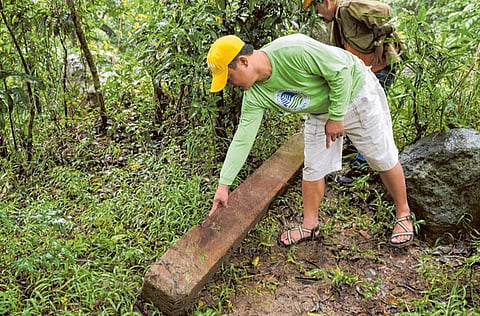Philippines: Forest rangers losing the battle against illegal logging
Poorly equipped and outnumbered, forest guards are no match for timber mafia

NORZAGARAY, Philippines: Father-of-five Alex Lesber patrols one of the Philippines’ most important forests carrying a cheap pistol and memories of a pastor being shot dead in front of him.
Lesber is one of just 2,000 poorly paid rangers trying to stop what the government admits is “rampant” illegal logging across the country, and their time roaming amid the vanishing forests is becoming increasingly dangerous.
Twenty of his colleagues have been murdered since the government imposed a nationwide logging ban in 2010, according to the environment ministry, a move that prompted already shady timber merchants to adopt more aggressive tactics.
“There is always that possibility that one of us could get hurt where we work. We arrest people, so naturally they hate us,” Lesber, 49, told AFP while patrolling Angat forest, one of the main watersheds for Manila’s dams.
The stakes are high for the Philippines, a tropical Southeast Asian nation of more than 7,000 islands that has lost more than half its forest cover over the past century.
There are only 7.6 million hectares (18.78 million acres) left to be guarded by men like Lesber. But the Philippines’ forest rangers are under-funded, out-numbered and extremely vulnerable, according to Environment Secretary Ramon Paje.
“Fighting illegal logging should be considered a military operation, rather than a regulatory one. We want the army at the forefront, rather than our rangers,” he told reporters recently.
One of the problems for the rangers is that corrupt government officials are often involved in the timber industry, according to environment activists.
This is part of a broader scourge across the Philippines of underpaid local officials or security forces being enticed into lucrative illegal businesses.
President Benigno Aquino has said repeatedly that corruption within government and society in general is the country’s biggest problem. Paje said at least eight city mayors around the Philippines were under investigation for allegedly protecting illegal loggers.
Tough life
From a tiny and sparse concrete building base in Norzagaray town, three hours’ drive north of Manila, Lesber and the other Angat rangers drive a beat-up pickup truck into the forests for patrols that last up to a week.
There are just eight rangers trying to protect 21,000 hectares of forests that serve as the watershed for nearly all of the tap water of the Philippine capital and nearby areas, home to 15 million people.
Aside from logging, the rangers have to contend with what they say are the even more ominous forces of slash-and-burn farmers.
Lesber said the rangers regularly received death threats as well as bribe offers, although he insisted they did not accept any cash despite each earning just 11,000 pesos (Dh970) a month.
Lesber said the rangers carefully picked their battles to avoid the most dangerous situations, typically avoiding slash-and-burn farmers because they were desperate people known to fight to protect their livelihoods.
“Unless they cause extensive damage, we let them be. I know they will not hesitate to kill me if I apply the law to the letter,” he said.
But with these tactics, Lesber said the rangers had watched helplessly as thousands of migrants settled in the watershed, clearing swathes of valuable forest for farms in recent years.
Monitoring duty
Arrests of illegal loggers are also rare, with the rangers instead preferring to confiscate timber left on the ground and perform monitoring duties.
Lesber, who wears a military-style jacket, jeans and rubber shoes to work, said he carried his own pistol while on patrol but that it was not enough. “I wish the government would give us guns. That would lessen the odds stacked against us,” Lesber said.


